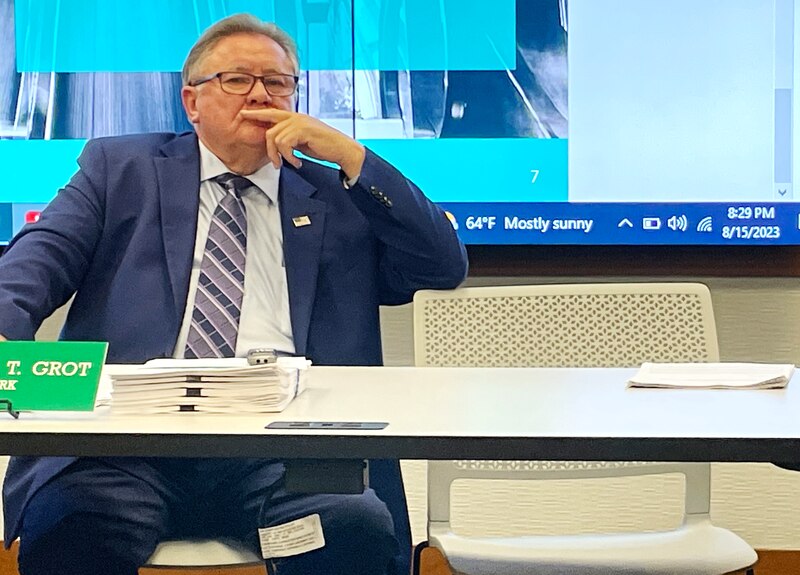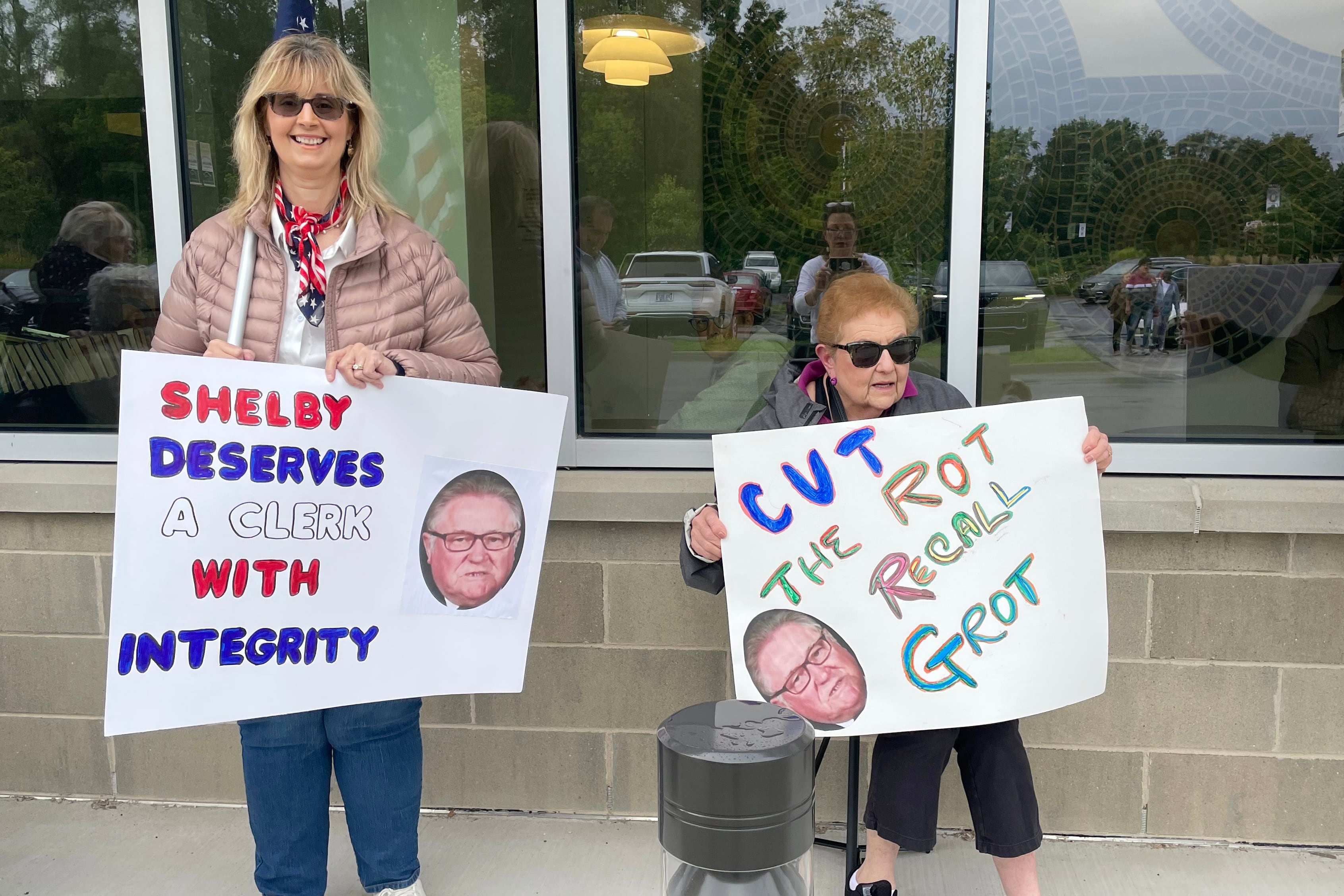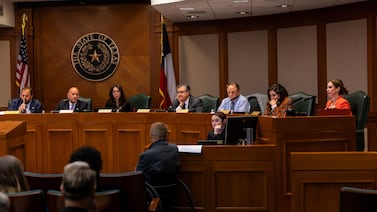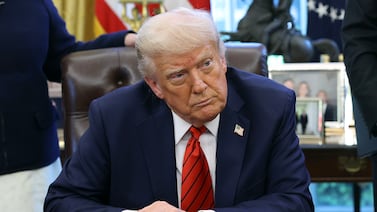Votebeat is a nonprofit news organization reporting on voting access and election administration across the U.S. Sign up for our free newsletters here.
Stanley Grot, the clerk of a suburban Detroit township who was among several “false electors” indicted last month for allegedly trying to subvert Michigan’s 2020 presidential vote, faced a harsh public reception Tuesday from several local residents calling for him to resign or face removal from his job, if even by a recall campaign.
Several people who spoke at the Shelby Township Board of Trustees’ meeting demanded that Grot step aside, saying he has “shamed” the township because of the eight-count indictment against him. The packed, civil audience of about 125 people at the township library was a far cry from the normal low-turnout proceedings, a member of the board noted.
Grot, whose job as clerk means he also sits on the board, was called out by some of his constituents on the state’s allegations that he was trying to to help throw a presidential election.
Jim Diez was among Shelby Township residents who showed up and addressed Grot directly, urging him to resign and then asking the township board to remove him if he doesn’t.
“I think it’s the best thing for the township. I think there is enough swelling in the township in both the Democratic and Republican party that if you don’t, then we’re going to have to figure out a recall. I hate to drag the whole township through it, but it’s just getting to that point,” said Diez.

An attorney for the Shelby Township Board said the board has no authority to remove Grot and that only the governor has the power to do so.
Grot is among 16 Republicans whom Michigan Attorney General Dana Nessel charged with felonies in July for trying to cast Michigan’s electoral votes for Donald Trump even though Joe Biden won the state.
The defendants, some of whom are scheduled for a Friday hearing in the case, are accused of secretly meeting on Dec. 14, 2020 in the basement of the Michigan Republican Party headquarters in Lansing and hatching a plan to submit forged certificates falsely certifying that Michigan residents had voted for Trump despite Joe Biden’s victory.
In light of the charges, the Secretary of State’s Office stripped Grot of his election duties last month, and the Michigan Association of Municipal Clerks suspended Grot’s membership rights. But Grot has retained other clerk duties for his township.
As Diez spoke at the meeting, he held up a copy of what he said was the certificate of the votes that the false electors had signed in 2020. His wife followed with her own criticism.
“You tried to overturn an election and you tried to end democracy as we know it,” said Alisa Diez in her 3-minute remarks during the public comments.

Grot listened to and faced his critics but did not address them, appearing mostly unemotional during the meeting.
At least one woman spoke in defense of Grot during public comment, asking the clerk’s detractors to give him the benefit of the doubt.
Representatives from voting rights organizations, like All Voting Is Local and Voters Not Politicians, also attended Tuesday’s meeting and presented a letter to the board asking the trustees to formally seek Grot’s resignation.
Before the meeting, protestors stood outside the library carrying placards, some of which read “Cut the rot, recall Grot” and “Grot must go.” The protests were peaceful and demonstrators put their signs away before going into the meeting.
Laura Brown told Votebeat Michigan before the meeting that she wants Grot to leave office because of the accusations and indictment against him.
“Anybody who knowingly submitted forged documents should be removed,” said Brown Tuesday.
Syma Echeandia said the best thing for the community is for Grot to resign.
“He has committed a crime, and we’re not stupid,” Echeandia said at the meeting. “He has attempted to defraud voters of Michigan, not just Shelby Township but the entire state. I understand the law, you can’t have him eliminated here. I understand that we have to do a recall. If the man has any grace whatsoever he would step down and he would avoid all this angst and aggravation that we have to put up with.”
Grot’s attorney, Derek Wilczynski, addressed the crowd Tuesday saying his client has no intention of stepping down.
“Mr. Grot is innocent until proven guilty,” said Wilczynski. “A fundamental principle of our government is that everyone is innocent until proven guilty.”
Wilczynski said he heard things said about his client at the meeting that are “fundamentally untrue,” including allegations that Grot signed the false electors’ certificate.
“Mr. Grot is accused of signing this document with the intent to defraud. That’s not what is even in the affidavit supporting the charges in this case,” said Wilczynski. “The charges against Mr. Grot are so thin, I’m confident he’s going to be found innocent. He looks forward to defending these charges and he looks forward to clearing his name.”
Wilzynski added that “this is at its core a political prosecution.”
No requests for petitions to begin the process of a recall or phone calls regarding possible recall of Grot had been received as of Wednesday morning, according to a staffer in the Macomb County’s Board of Canvassers office.
Grot’s four-year term is up in November 2024. Under state law, he would not be subject to a recall petition filed in his last year.
Initiating a recall election of a public official in Michigan requires following an extensive formal process. The effort in Shelby Township would require petitioners to gather 9,649 signatures of local voters supporting such an election, equal to 25 percent of the township residents who voted in last year’s gubernatorial election.
A key Republican figure in Macomb County, Grot was appointed as Shelby Township clerk in 2012 and elected for each of his terms since. He previously served as Sterling Heights councilman and in various Macomb County positions including commissioner and the county’s deputy treasurer.
Grot is also a former chairman of the Macomb County Republican Party and is currently the 10th Congressional District Republican chairman.
Michigan recently saw a successful recall of a local clerk in May, when voters in Adams Township in Hillsdale County removed Clerk Stephanie Scott. The Secretary of State’s Office had stripped Scott of her election duties after she refused to conduct mandatory routine maintenance of the township’s voting system, which she alleged might contain evidence of cheating in the 2020 election.
Oralandar Brand-Williams is a senior reporter for Votebeat in partnership with Bridge Michigan. Contact Oralandar at obrand-williams@votebeat.org.






